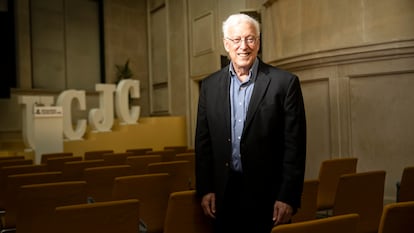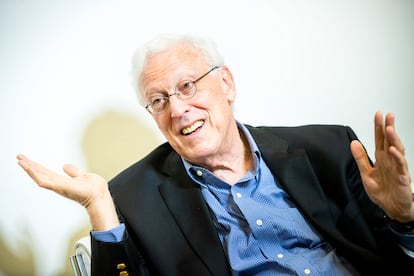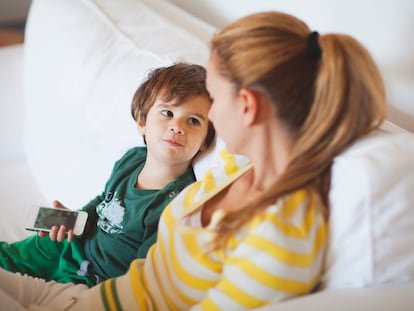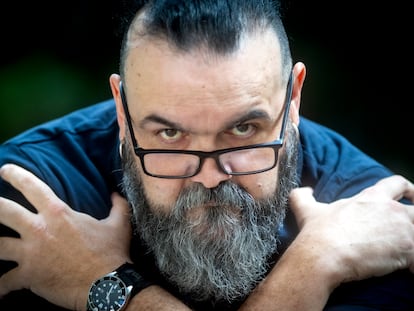Robert J. Sternberg, psychologist: ‘Your intellectual abilities are constantly changing; intelligence is something you pick up’
The author of the famous triangular theory of love, an expert in the study of creativity and its use in education, emphasizes the need to work with others to solve problems


Robert J. Sternberg will go down in the history of psychology thanks to his famous triangular theory of love, which holds that love can be understood in terms of three components: intimacy, passion and commitment. However, this American psychologist has also devoted a lot of time to the study of human intelligence, creativity and its use in the world of education. He is convinced that teaching should not be a simple transmission of knowledge, but a comprehensive development of intelligence. The outgoing Sternberg, former president of the American Psychological Association, was recently in Madrid, Spain, sharing his knowledge with the students and teachers of the Camilo José Cela University, where he also talked with EL PAÍS. Although he directed the Center for the Psychology of Abilities, Competencies and Expertise at Yale University, he is currently a professor at Cornell.
Question: You talk about three types of intelligence: analytical, creative and practical. Which is better to have?
Answer. You always need some combination, because you use your creative skills to generate ideas that are new and hopefully useful. But everyone has bad ideas. Even Socrates. So you need analytical skills to say whether the idea is good. But you also need practical skills to communicate your ideas in a way that people can understand. Take an interpersonal relationship with your husband or your wife or your boyfriend or girlfriend; when things aren’t working – which of course never happens to us, but it happens to other people [laughs] – you need analytical skills to say, “What’s going on here? Is he having an affair? Is he sick of me? Are we failing to communicate?” And you need creative skills to say, “Well, if things are going well, how can I make them go better?” And you need practical skills to make sure that whatever ideas you come up with actually work with your husband or your wife.
Q. Now more than ever we have to work transversally as part of a team, a skill that companies ask to promote in schools.
A. That’s a great point. The tests we use to measure IQ are always are almost always individually based, but real world problems almost never are. They almost always involve interactions with people like your husband, your wife, your boss, your coworkers, your friends, the people in an organization, the people in your church. And so, we emphasize your abilities, but we should also be concerned about emphasizing how to work with others, because that’s the way almost all real world problems are solved.
Q. That’s why you have your own intelligence test.
A. IQ tests tell you a little bit about a person’s sort of abstract, analytical thinking, and that’s important. The problem is that most real world problems are nothing like IQ tests. No one says, “Let me tell you exactly what the problem really is.” You have to figure it out. And if you don’t realize that something is wrong, by the time you figure it out, you may be getting the divorce papers or whatever. What I emphasize in my own theory is that we need to use problems that are more like the problems people encounter in everyday life. In my talks here, I gave examples of real world problems. There can be problems between a husband and wife, between two countries, between two organizations. But real problems are very messy. They’re emotionally laden. But your intellectual abilities are constantly changing. Intelligence is something you pick up.
Q. In Spain, many families now think that their children are gifted.
A. In our world. It’s very similar in the United States. There’s sort of a growing narcissism; we think we’re special. I think it’s partly a societal trend. I have five kids. I have triplets who are 12, and I have two older children. And much more useful than thinking that your kid is gifted, is to think, “What am I going to do for my kid?” Helping children recognize what they’re passionate about, and encouraging them to develop passions. Like my boy Sammy right now, he is really into rare coins, so I encourage that, because he learns a lot about the world through studying coins. One girl is really interested in dolls, the other in clothes. Everyone has strengths and weaknesses. What I want to do to help them prepare for life is figure out what they have to contribute to the world, what they can do to say, when they’re older, “I had a good life, but I also made life good for other people.” You have to be ready to learn about a new environment and either adapt to it or change yourself to fit the environment. It’s happened to me. I quit a job, a really well-paying job after a few months because I saw that the values of the people in this institution simply did not match my values. You have to find environments that make you feel who you are.

Q. Do you think healthy competition between students should be encouraged?
A. In life, there’s always competition of some sort. But I think that schools often emphasize competition too much, because so often the way you solve problems is through collaboration. So it’s odd that we spend so much time saying things like, “Who did better in this test?” What we need to do is work together. The invasion of Ukraine was a really good example of how countries learned they can’t each go their own way. I have a theory of love, and one of the things that kill relationships is when couples are so used to competing that they start competing with each other. Instead of being happy with each of their successes, they’re not happy. I’ve even seen parents competing with kids. It’s crazy.
Q. Isn’t that excessive?
A. No. Why do they compete with their kids? I talk about the increasing narcissism and parents get upset. I view my older kids as more successful than I am. They have great marriages, they have great kids. They do well in their job. You know, my life is a string of failures. They’ve done really well and that makes me happy. But some people might say, “They’re doing better than I did, and that makes me feel smaller. It makes me insecure, it makes me feel like they’re succeeding and I’m not.” And that can happen with kids, with siblings, with parents. That’s really destructive. But, you know, these are tough times.
Q. Then there are the so-called “helicopter parents” who hover over their children’s education, without letting them be autonomous.
A. Neither of my parents finished high school, so they couldn’t help me. At the time I thought it was a disadvantage because other kids had parents who went to universities and they were doctors and lawyers; my father sold buttons for a living. But I later concluded that I had an advantage: no one was going to make me successful. I wasn’t going to take over my father’s business. There are many people who you look at them and say, “If it weren’t for their parents...” I mean, Donald Trump’s kids might be selling shoes in a shoe store or something.
Q. Do you have to be bored to become creative?
A. No. Being creative is mostly a way of living. It’s not something you get when you’re bored. It’s when you decide that you don’t have to do things the way other people do. But when you’re creative you pay a price, because people don’t like it. Even when they say they want you to be creative, what they really mean is: “Be creative as long as it doesn’t get in my way. As long as you leave me alone and you don’t threaten my job or my way of thinking.” You have to be willing to defy yourself.
Sign up for our weekly newsletter to get more English-language news coverage from EL PAÍS USA Edition









































